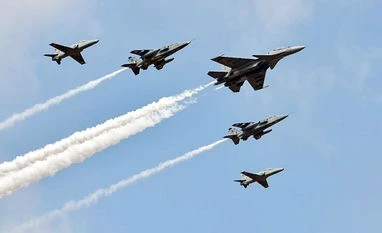Aero India Show, which seeks to display India's growth in aerospace and defence capabilities, has put the spotlight on related stocks. Analysts say the event would improve the sector’s long-term growth prospects.
"Nearly 809 companies, from 98 countries, are taking part in Aero India 2023. 251 agreements are expected with investments of Rs 75,000 crore. This is expected to improve revenue visibility of defence companies, especially those engaged in aerospace," said Deepak Jasani, head of retail research at HDFC Securities.
Scheduled to run between February 13 and 17, Aero India Show has Airbus, Boeing, Dassault Aviation, Lockheed Martin, Israel Aerospace Industry, BrahMos Aerospace, Rolls Royce Larsen & Toubro (L&T), Bharat Forge, Bharat Electronics (BEL), Bharat Dynamics (BDL), Hindustan Aeronautics (HAL), and BEML among attendees.
HAL and General Atomics Aeronautical Systems Incorporated (GA-ASI), on Wednesday, announced that turbo-propeller engines, which power MQ-9B Guardian High Altitude Long Endurance (HALE) Remotely Piloted Aircraft System (RPAS), will be supported by HAL's engine division for the Indian market.
Besides, HAL and Response Plus Holding PJSC RPM will explore opportunities in the areas of emergency medical services, medical evacuation, helicopter emergency medical services HEMS, and other fields in India, and the Gulf and the MENA Middle East and North Africa regions.
Long-term play
Analysts believe the stocks are a good bet for long-term investors. In the near-term, however, they believe a modest growth in the defence budget for financial year 2023-24, coupled with premium valuations of related stocks, could weigh.
"In the last three years, average revenue for the sector grew by 10-12 per cent, and profitability by 18-20 per cent. We have a neutral rating on the sector as the total defence budget expenditure, for the upcoming financial year, has increased only by 1.5 per cent from the revised budget estimates for FY23. Moreover, the sector is trading at a 30 per cent premium to its historical average," said Anil R, senior research analyst at Geojit Financial Services.
The Budget 2023 has allocated Rs 5.94 trillion for defence and related services for FY24, up 13 per cent from the budgeted estimate of Rs 5.25 trillion in FY23. The total capital outlay is Rs 1.62 trillion, an increase of 16 per cent over the previous fiscal year’s budgeted allocation of Rs 1.52 trillion. By comparison, investors expected up to Rs 6.6-trillion allocation.
On the bourses, players such as BEML, Bharat Dynamics, HAL, and Paras Defence have tumbled up to 14.6 per cent since Budget 2023 was presented on February 1, after surging up to 10.5 per cent six months prior to the Budget presentation. In comparison, the Nifty50, and Nifty500 indices have gained 1.5 per cent, and 0.22 per cent so far this month, ACE Equity data shows.
"Defence stocks had risen ahead of the Union Budget expecting enhanced allocation, an expectation that remained unfulfilled. Besides, Q3FY23 results of most defence companies were unexciting. While margins may fluctuate in a narrow range during upcoming quarters, revenue growth would depend on execution speed," said Deepak Jasani of HDFC Securities.
Investment strategy
Against this backdrop, analysts advise long-term investors to accumulate/add defence stocks on every correction, and hold over a few quarters.
"The government is focused on improving indigenisation and achieve export target of $25 billion by FY25. This will lead to stronger order inflows for the domestic companies. Most defence-related stocks would remain range-bound until big order announcements kick in as most of the positives with respect to all-time high order book, and margin expansion seem to be priced in," said Khadija Mantri, associate vice president for research, Sharekhan by BNP Paribas. She prefers HAL, and BEL.
Anil R of Geojit Financial Services added that investors with a short-to-medium term view can, however, reduce exposure.
"Long-term investors could focus on companies that are developing cutting-edge technology, have a large backlog of orders, are financially stable, and are increasing capacity," he said.
Unlock 30+ premium stories daily hand-picked by our editors, across devices on browser and app.
Pick your 5 favourite companies, get a daily email with all news updates on them.
Full access to our intuitive epaper - clip, save, share articles from any device; newspaper archives from 2006.
Preferential invites to Business Standard events.
Curated newsletters on markets, personal finance, policy & politics, start-ups, technology, and more.
)